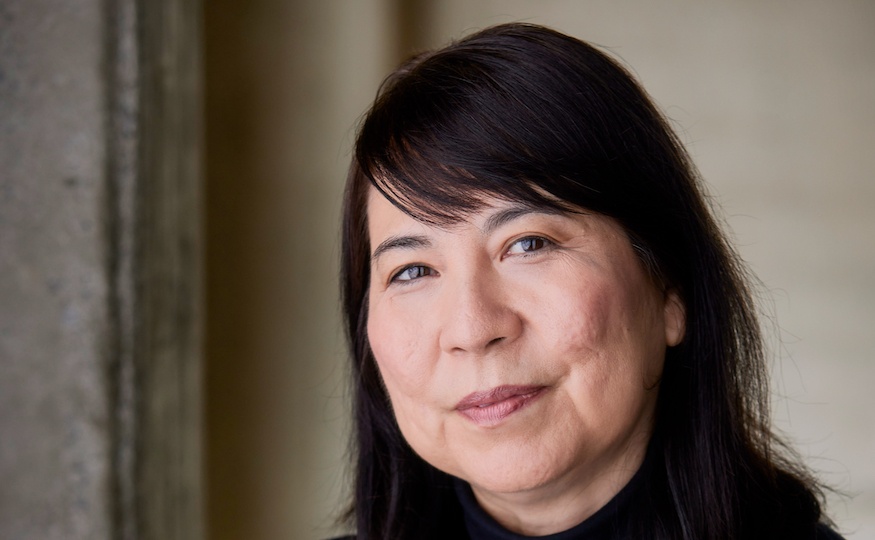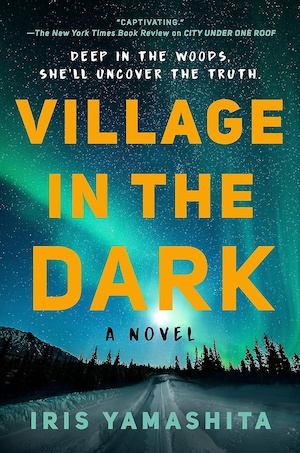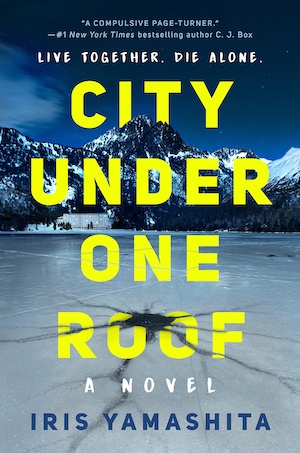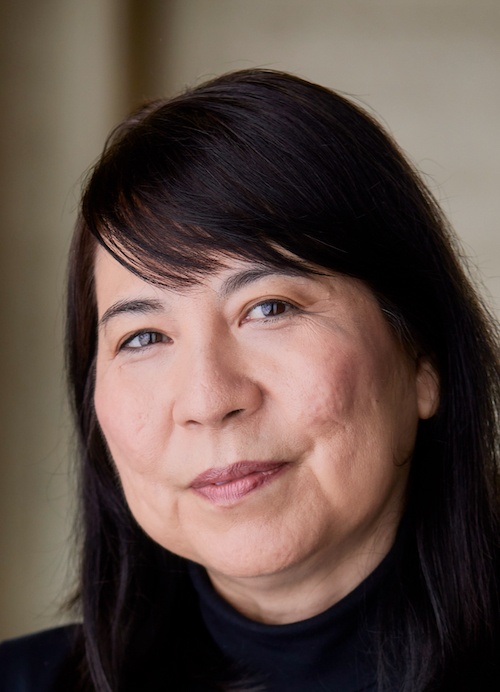
Although some people liken it to Nordic noir due to the latitude, Alaskan crime fiction has its own vibes and tropes. In some ways, it’s like that 90s TV show Northern Exposure, with murder thrown in. Quirky and dark. The cold is a killer, the wilderness is a killer, some of the people are pretty used to killing too. In crime fiction, you get the odd and esoteric end of that with John Straley. For the dark, primeval side there is William Giraldi, and recently we’ve had True Detective: Night Country.
We’re always on the lookout for new Alaska-based crime fiction, and last year the screenwriter Iris Yamashita appeared with City Under One Roof, a novel that managed to be creepy, claustrophobic and agoraphobic all at once, and which won our Best Debut Editor’s Choice Award in 2023. Now Iris is back with Village in the Dark, which also features the detective Cara Kennedy, but this time there’s more focus on the mystery, less on the mood and it’s a case that’s a lot more personal to the protagonist.
In 2006, Iris helped write the script for Clint Eastwood’s Golden Globe-winning film Letters from Iwo Jima, and she still writes for radio, film and television. However, we decided to invite her to join us on Crime Fiction Lover to talk about her mystery novels…

Can you bring us up to speed on Cara Kennedy, your Alaskan cop, as she takes on her second fictional mystery?
Cara has been tormented by the loss of her husband and son whom she believed had perished in a hiking accident. At the beginning of Village in the Dark, she has just found a clue that foul play may have been involved and is having their bodies exhumed for an autopsy. What happened to her family is the mystery she must solve.
You’ve really put her through the mill between City Under One Roof and Village in the Dark. Can you tell us more about that and why you did it?
It’s always more interesting when the stakes are personal. In the first book, Cara (who is claustrophobic) must solve a gruesome crime while being trapped in a city where the population lives in a single, high-rise building. At the time, she believes it’s unconnected to what happened to her family. In the second book, the stakes and threats are much closer to home as she follows a complex web for answers.
Who or what is she up against in Village in the Dark?
That is the mystery. In the first book, Cara meets with adversaries, and in the second book, we find out that they may be part of a much larger operation.
What are the main themes that you wanted to explore?
In both books, I explore the idea of community. In these isolated microcosms, residents need to rely on each other for survival and have come up with their own unwritten rules to protect themselves.
Also, in my research I discovered that Alaska is the state with the highest incidences of violent crimes against women, especially among the Indigenous and wanted to put a spotlight on that. I was lucky to be able to consult with someone from the Alaska Native Women’s Resource Center (AKNWRC) on certain passages.
Alaska is a fascinating setting for crime fiction. What’s your take on the setting and what have you tried to bring out about it?
Alaska is often described as the last frontier. Aside from the weather elements, there are also vast swaths of wilderness that cover the state, and over 2,000 people go missing there each year. I think that’s what makes it a great setting for a mystery. It takes a certain kind of toughness to be able to live in the more isolated regions, so that also makes it ideal for portraying strong and formidable women.
In crime fiction, Alaska ranges from primal killing country to a quirky land of misfits. What other Alaskan crime fiction do you recommend?
Unfortunately, I’m mostly an ignoramus here. I’ve watched some Alaska reality shows such as Life Below Zero, which showcases amazing people who are able to live in isolation in Alaska. I have just started watching the latest season of True Detective and love it so far. I also thought the movie Insomnia was a great mystery set in Alaska. The mix of weather and isolation can kind of mess with your mind, and I love the local folklore and mythology that add to the ambiance of a mystery. Another mystery series that I have enjoyed watching set in cold weather, but not in Alaska, is Fargo.

You’ve been a very successful writer for screen as well. What made you decide to write City Under One Roof and what are the differences for you between novels and film/television?
Although I love writing Asian historical stories, I’ve been finding that they are very difficult to get produced, and it was hard to break out of being pigeonholed in that category. In order to write other types of stories, I’ve been exploring other media. Books have proven to be a great outlet. I don’t think I would ever have been given a chance to write a contemporary mystery otherwise. Writing novels is definitely more liberating because I can work on my own original ideas. In film and streaming, unless you’re a heavyweight like Christopher Nolan, you’re usually a writer for hire working off of someone else’s IP, someone else’s idea or someone else’s vision.
What are your influences in crime fiction and what have you read recently?
I have to say once again that I’m an ignoramus in the mystery reading category and have only recently started immersing myself into this world. When I was young, I really enjoyed watching the first season of David Lynch’s Twin Peaks. Also, watching Jane Campion’s Top of the Lake was the first time I felt drawn to writing a mystery.
I’ve recently read Kemper Donovan’s The Busy Body – a fun Agatha Christie type mystery, and also Nina K Simon’s best seller, Mother Daughter Murder Night. Both books are witty, full of humour and engrossing page turners.
One influence I often mention is Lewis Carroll’s Alice’s Aventures in Wonderland. Driving through the 2.5-mile single lane tunnel leading to Whittier, Alaska – the inspiration for my fictional town of Point Mettier – I felt as though I were falling down a physical rabbit hole that would lead to a Wonderland full of odd characters. I dropped a number of references to Alice in Wonderland in the first book and for the second book, I make references to Alice Through the Looking Glass. While not important to the story, it was fun to write them and I have been revealing the references in my newsletters.
Were you surprised by the reception City Under One Roof received?
Yes, I was amazed at how welcoming the book world is and what a great community of authors there are who support each other. I still feel like a newbie, however, and am still trying to learn the ropes. Certainly, my publisher Berkley, and their editorial, publicity and marketing team have all done an amazing job in giving me a leg up.
What’s next for Iris Yamashita?
I’m currently working on an audio series for BBC World that has to do with the 442nd Regimental Combat Unit – a segregated Japanese American regiment that fought during WWII. Although that has taken time away from writing novels, I have an outline for my next mystery novel and hope to be jumping back into it very soon.
